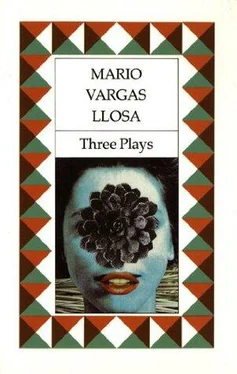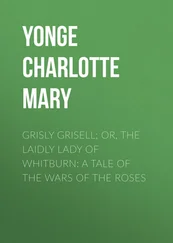( As the lights come up, we find SEÑORA CARLOTA on stage. MAMAE, from her armchair, looks her over respectfully. She gets up — a young woman once again — and goes towards her. )
MAMAE: Good afternoon, Senora Carlota, what a surprise. My aunt and uncle are out at the moment; so is Carmencita. Do sit down, please. May I offer you a cup of tea?
SEÑORA CARLOTA: ‘Just as if she’d stepped out of a watercolour by Maestro Modesto Molina.’ I heard somebody saying that about you at the Alameda, at the open air concert. It’s true, you’re just like that.
MAMAE: You’re very kind, Senora Carlota.
SEÑORA CARLOTA: Raven hair, porcelain skin. Manicured hands, and such dainty feet. Yes, the perfect little doll.
MAMAE: For goodness’ sake, Señora, you’re making me blush. Won’t you sit down? Uncle and Aunt won’t be long. They went to express their condolences to …
SEÑORA CARLOTA: Young, pretty and, besides, a considerable inheritance in the offing, am I right? It is true, isn’t it, that the plantation your father had in Moquegua is being held in trust for you until you come of age?
MAMAE: Why are you saying all these things to me? And why that tone of voice? You’re talking as if you were angry with me for some reason.
SEÑORA CARLOTA: Anger isn’t quite the word, my sensitive little flower. I’m not angry with you. I hate you. I hate you with all my power and all my mind. All year I’ve been willing on you the worst possible disasters. That you’d get run over by a train. That your face would be eaten away by smallpox. That your lungs would be racked with tuberculosis. That the devil would take you!
MAMAE: But what have I ever done to you, Senora Carlota? I hardly even know you. Why are you saying such dreadful things to me? And here was I thinking you were coming to give me a wedding present.
SEÑORA CARLOTA: I’ve come to tell you that Joaquín doesn’t love you. He loves me. You may be younger. You may be a virgin, you may still be unmarried! But he doesn’t like delicate little ornaments that blow over in the wind. He likes me. Because I know something young ladies like you will never learn. I know how to love. I know what passion is. I know how to give pleasure and how to receive it. Yes, it’s a naughty word for you, isn’t it? Pleasure.
MAMAE: You’ve taken leave of your senses, Senora Carlota. You’re forgetting …
SEÑORA CARLOTA: That I’m married and I’ve got three children? I haven’t forgotten. I don’t give a damn! Not for my husband, my children, Tacna society, the Church — they can say what they like — I don’t give a damn! That’s love, you see. I’m prepared to do anything, rather than lose the man I love.
MAMAE: If it is as you say, if Joaquín does love you, why has he asked me to marry him?
SEÑORA CARLOTA: For your name, for the plantation you’re going to inherit, because an officer has to safeguard his future. But, above all, because he can’t marry the woman he loves. He’s marrying you because it’s convenient. He’s resigned himself to marrying you. Did you hear that? He’s re-signed to it. He’s told me so himself, hundreds of times. Only today in fact — not two hours ago. Yes, I’ve just come from being with Joaquín. I can still hear the sound of his voice echoing in my ears: ‘You’re the only one who can really give me pleasure, my soldier’s girl.’ That’s what he calls me, you see, when I abandon myself to him: his soldier’s girl, his little soldier’s girl.
MAMAE: Señora Carlota, you’ve gone quite far enough. Please, I beg you …
SEÑORA CARLOTA: I’m shocking you, I know. But I don’t care. I’ve come to make it quite clear to you that I’m not going to give Joaquín up, even if he does marry you. And he won’t give me up either. We’re going to carry on seeing each other behind your back. I’ve come to tell you what your life will be like, after you’re married. Every morning, every afternoon, wondering if your husband’s really gone to the barracks — or if he’s making love with me instead.
MAMAE: I’m calling the servants to show you to the door, Señora Carlota.
SEÑORA CARLOTA: And if Joaquín is transferred, I’ll leave my husband and my children and I’ll follow him. So all your doubts and torments will continue. I’ve come just so that you know how far a woman in love is prepared to go. Do you see?
MAMAE: Yes, señora. I see. Maybe it is true what you say. I’d never be capable of behaving like that myself. For me, love could never be a disease. I can’t understand you. You’re beautiful, elegant, and your husband such a distinguished man — the whole of Tacna respects him. And such lovely little children too. What more can anyone want in life?
SEÑORA CARLOTA: All right, maybe that’s how you see it. But all these things you seem to hanker after, I’d gladly sacrifice the lot, just for one word from Joaquín. I’d risk hell if that’s the price I have to pay to go on seeing him.
MAMAE: I’m sure God will be listening to you, Senora Carlota.
SEÑORA CARLOTA: Then he’ll know I’m telling the truth. When Joaquín holds me in his arms, when he hugs me and subjects me to his little whims, nothing else in the world seems to exist any more: not my husband, my children, my reputation, or even God. Only him. And you’re not going to take that away from me.
MAMAE: How long have you been Joaquín’s … Joaquín’s lady-friend?
SEÑORA CARLOTA: His mistress? Two years. And I’m going to tell you something else. We see each other every week in a little hut in La Mar. At sunset. When the negroes return singing from the plantations. We always hear them. We know all their songs by heart we’ve heard them so often. What else would you like to know?
MAMAE: Nothing, señora. I’d be grateful if you’d leave now.
SEÑORA CARLOTA: You could never live with Joaquín. You’re too pure for such a hot-blooded man. He says so himself. Go and find yourself some tepid youth somewhere. You could never be a soldier’s girl — not to Joaquín or to anyone. You’re too insipid, you’re not flirtatious enough, you haven’t got the imagination.
MAMAE: You must go this instant! My aunt and uncle will be back at any moment, señora!
SEÑORA CARLOTA: Let them see me, for all I care. Let the scandal break out once and for all.
MAMAE: It won’t be my fault if it does. I’ve heard nothing; I know nothing, and I don’t want to know anything either.
SEÑORA CARLOTA: And yet, you’ve heard everything; you know everything. And now it’ll start to nag away at you like a little worm gnawing at your heart. ‘Is he really only marrying me because it suits him?’ ‘Is he really in love with her?’ ‘Does he really call her his soldier’s girl when he holds her in his arms?’
(SEÑORA CARLOTA leaves . BELISARIO, who at the beginning of the dialogue between SEÑORA CARLOTA and MAMAE was writing, making notes and throwing papers on the floor, has suddenly become pensive, and has been taking more and more interest in what the two women are saying. He finally goes over to MAMAE’ s armchair, where he sits crouching like a child. MAMAE talks to herself as she goes back towards her armchair. She has become an old woman again. )
MAMAE: Did he really tell her I was a sensitive little flower? A little prude who’ll never be able to make him happy like she can? Was he really with her yesterday? Is he with her now? Will he be with her again tomorrow?
( She sits huddled in her chair . BELISARIO is at her feet, listening to her like a little child. )
BELISARIO: So the wicked woman made the young bride terribly jealous.
MAMAE: It was worse than that. She caused her great distress and alarm, and filled her innocent little head with all sorts of monstrous thoughts so that her brain seethed with vipers and vultures.
Читать дальше












